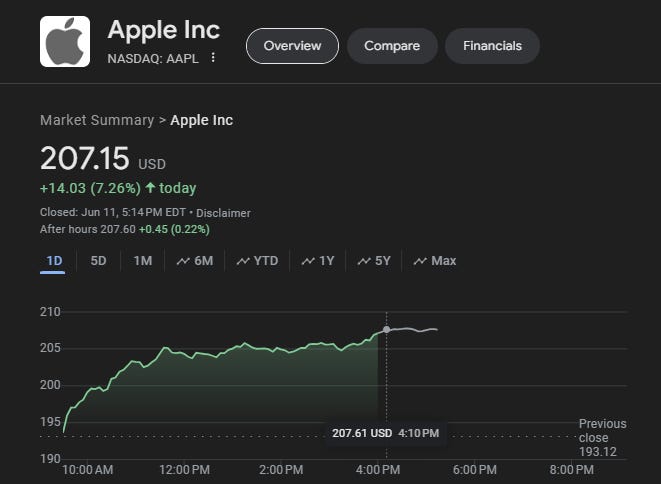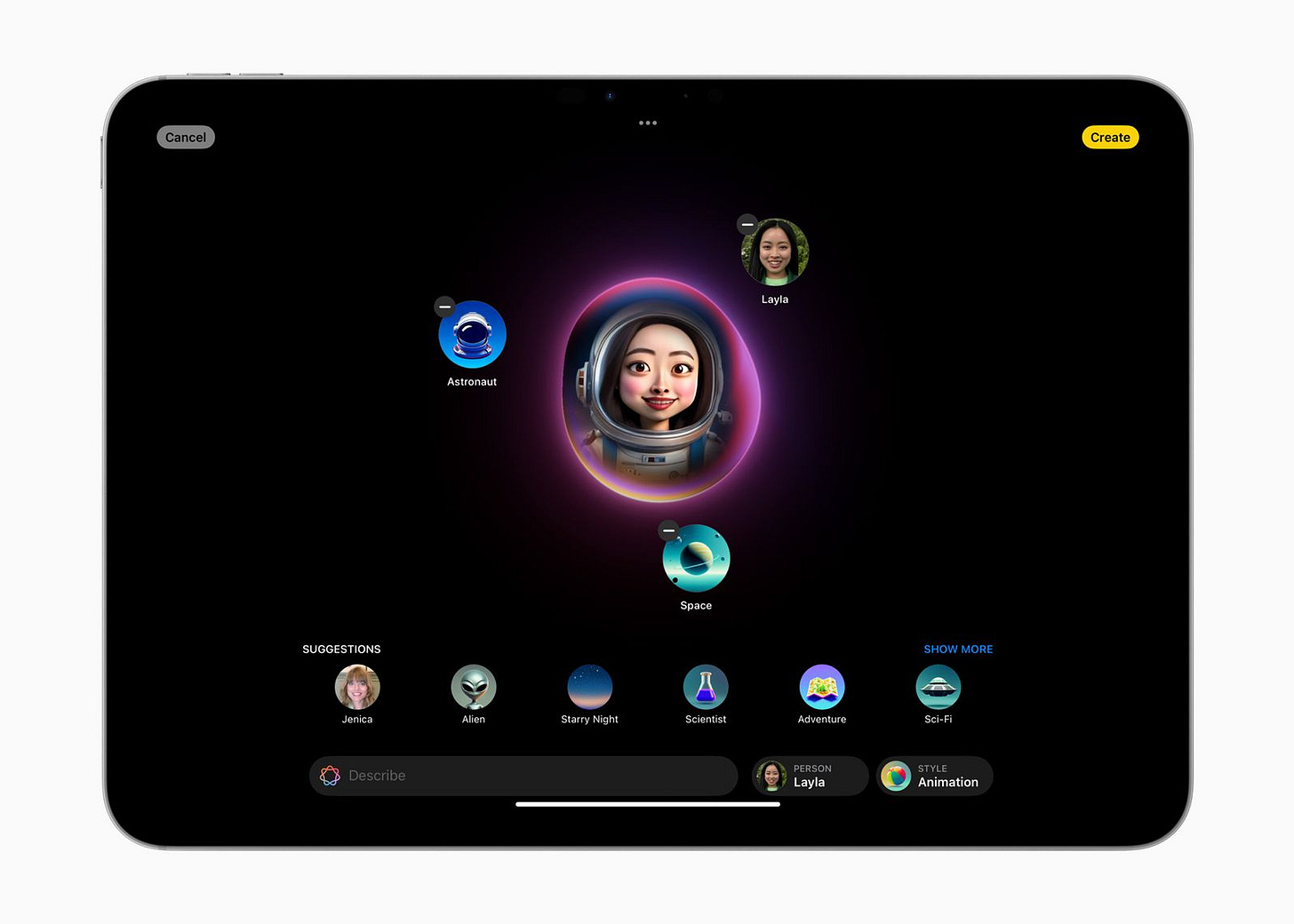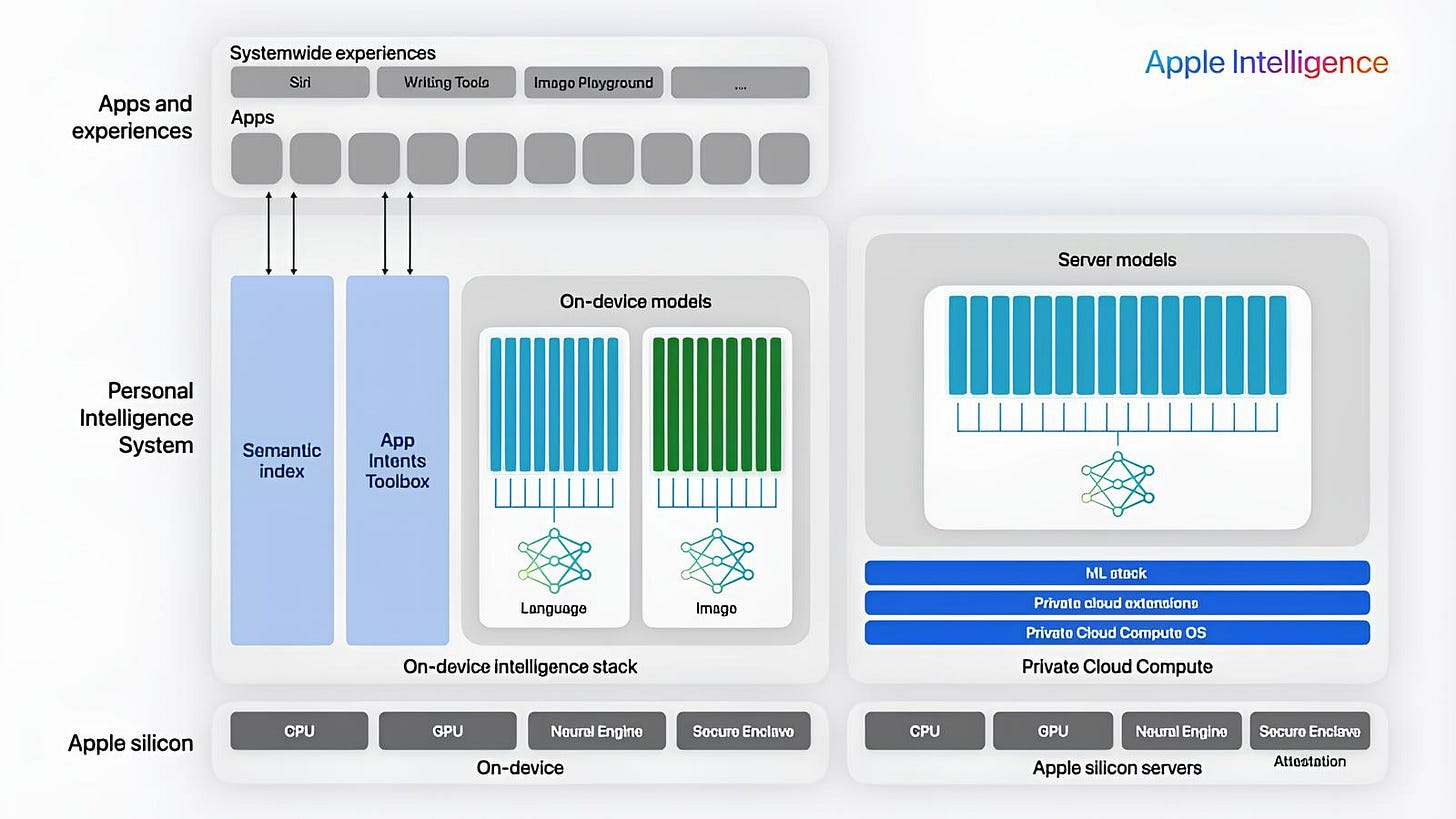Is Apple finally getting ready for the AI war?
At WWDC 2024, Apple unveiled Apple Intelligence, improvements to iOS, macOS, watchOS, & tvOS, and launched visionOS 2, which provides more ways to interact with Apple Vision Pro.
If you would like exposure to the biggest opportunities at the intersection of Generative-AI, Virtual Reality, Gaming and Web3, reply to this email to learn more about our upcoming Fund II.
Apple held its annual Worldwide Developers Conference on Monday and announced its latest AI developments - one day later, it spurred the stock to hit an all-time high of $200. Here are our key takeaways from the event:
‘Apple Intelligence’ is a big leap into personalization for its users.
The integration of AI, particularly in collaboration with OpenAI, enables Apple to provide more personalized and efficient user experiences, ranging from enhanced Siri interactions to more intelligent app features.
Apple is making privacy front and center.
Apple Intelligence will leverage cloud-based models on special servers using Apple Silicon to ensure private and secure user data. If a request needs to go to a cloud server, Apple says it will only send a limited selection of data in a “cryptographically” secure way.
Siri is getting smarter.
iOS18 will employ ChatGPT to improve the responsiveness and usefulness of its virtual assistant Siri — enabling users to seamlessly switch between text and voice.
New GenAI tools unlock creative potential.
Apple's AI-powered picture and emoji-generating tools, such as Genmoji and Image Playground, allow users to customize and animate digital expressions more vividly.
The announcements weren’t without its detractors.
Elon Musk warned that he’d ban devices over security fears in a Tweet shortly after the OpenAI + Apple announcements.
Slow and steady may win the race.
Apple's AI vision is not about a single large model but rather a number of smaller models that do not require the same amount of processing power and memory and that work on Apple's devices and CPUs. This, along with Apple’s incremental approach to AI integration, is different than trying to jam new tech into old products. Many of the AI features Apple highlighted on Monday are comparable to tools launched over the last year. Apple's AI can summarize and rewrite papers, create tiny graphics, and interpret conversations in real time.
The market for third-party AI apps is getting smaller.
Apple's ecosystem now directly includes features comparable to those seen in third-party programs such as Grammarly, 1Password, AllTrails, Soulver, Bitmoji, and Bezel. This integration reduces the need for separate apps by including these services inside Apple's software stack.
Apple's choice to keep AI services free might offer them a significant advantage over competitors.
Samsung in particular, as the 2025 deadline for Samsung's free services approaches. Observing how these tech companies adapt and change the smartphone experience will be intriguing as the AI integration competition heats up.
Hartmann Capital Weekly: Choose which topics you want delivered to your inbox with this one question survey.
Meet the new VisionOS 2.
It is enhanced with gesture-driven controls and the ability to turn regular photos into spatial ones for Vision Pro, which now supports ultra-wide displays. The results are stunning, with no ghosting or distorted edges.Safari 18 for visionOS 2 beta now supports WebXR
This enables immersive VR experiences via the web.
Lag be gone.
Hand tracking has been upgraded from 30Hz to 90Hz, eliminating the lag issues caused by the previous disparity with its 90Hz display, which was problematic for gaming and less responsive compared to the Quest's 60Hz.APIs and Devs are a big driver for adoption.
Other noteworthy updates include TabletopKit for building interactive, table-centric games and comprehensive Enterprise APIs that expand control over device sensors, including access to the main camera for enhanced application functionalities.And through the new VisionOS sessions, developers can access hands-on labs, sample code, documentation, and expert guidance to master developing this new spatial computing platform.
No longer an American exclusive.
Apple's Vision Pro will be available for preorder in China, Hong Kong, Japan, and Singapore on June 13th at 6 PM PT and released on June 28th. Preorders for Australia, Canada, France, Germany, and the United Kingdom start on June 28th at 5 a.m. PT and will be available beginning July 12th.
Moving ahead, Apple Intelligence and visionOS 2 will encourage industry innovation and competition, focusing on privacy, better productivity, and immersive content. The emphasis on AI and VR integration, upgraded hardware, and new development tools will raise the standard, inspiring other companies to better their technologies and user experiences.
Disclaimers:
This is not an offering. This is not financial advice. Always do your own research.
Our discussion may include predictions, estimates or other information that might be considered forward-looking. While these forward-looking statements represent our current judgment on what the future holds, they are subject to risks and uncertainties that could cause actual results to differ materially. You are cautioned not to place undue reliance on these forward-looking statements, which reflect our opinions only as of the date of this presentation. Please keep in mind that we are not obligating ourselves to revise or publicly release the results of any revision to these forward-looking statements in light of new information or future events.










